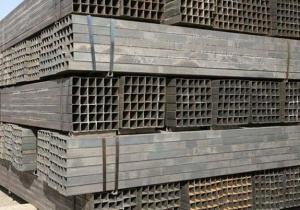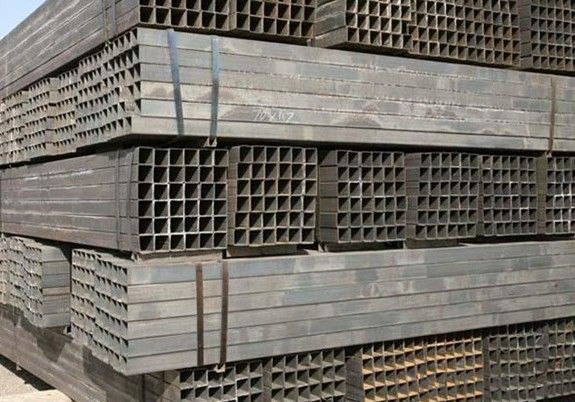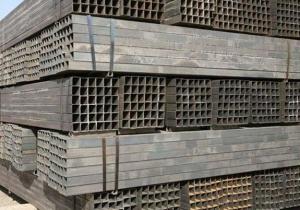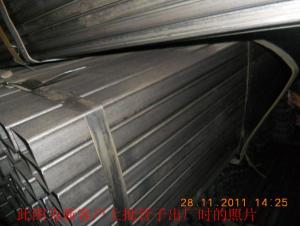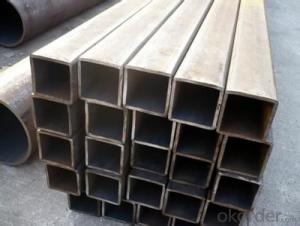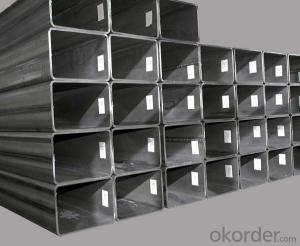HOLLOW SECTION TUBE16Mn
- Loading Port:
- China Main Port
- Payment Terms:
- TT OR LC
- Min Order Qty:
- -
- Supply Capability:
- -
OKorder Service Pledge
OKorder Financial Service
You Might Also Like
Product Name | ||
Size | Size: | 10*10--500*500mm |
Thickness: | 0.45--16mm | |
Length: | 3-12m | |
Steel Grade | Q195,Q215,Q235,Q345,16Mn, 20# | |
Standard | ASTM A500,EN10219,GB/T6728,GB/T6725,JIS G3466 | |
Usage | 1. For Structure, Airport, Railway 2. Construction and so on. | |
Ends | Plain end or By Your Choice | |
Surface | Bared Or With Oiled Or Galvanized | |
Technique | ERW ,Hot Rolled and Cold Rolled | |
Section Shape | Rectangular | |
Inspection | With Hydraulic Testing, Eddy Current , Infrared Test | |
Package | Bags, Bundle, In Bulk, Containers | |
MOQ | 20 Metric Ton / Can Be Negotiated | |
Supply Ability | 15,000 Metric Ton/Month | |
Date of Delivery | 7 days(Qty within 1000 Metric Ton) or According To The Quantity | |
Port of Shipment | Tianjin, China | |
Payment | L/C T/T | |
- Q: What are the common methods of joining steel pipes?
- The common methods of joining steel pipes include welding, threading, and using mechanical couplings. Welding involves fusing the pipes together using heat, while threading involves screwing the pipes together using threads on the ends. Mechanical couplings are devices that connect the pipes together using compression or other means.
- Q: What is the maximum allowable deflection for steel pipes?
- The maximum allowable deflection for steel pipes depends on various factors such as pipe diameter, wall thickness, material strength, and the intended application. It is typically determined by industry standards and specific engineering considerations.
- Q: How much is the wall thickness standard of building 48?
- Steel tube (Steel pipe) production technology development began in the bicycle manufacturing industry, the rise of the early nineteenth Century during the oil development, the two world war ships, boilers, aircraft manufacturing, manufacturing of power boiler after the Second World War, the development of chemical industry of petroleum and natural gas drilling and transportation, will effectively promote the the yield and quality of varieties, the development of steel tube industry.
- Q: How are steel pipes used in the manufacturing of boilers and heat exchangers?
- Boilers and heat exchangers rely on steel pipes as an essential component due to their exceptional properties and capabilities. These pipes are specifically designed to endure high temperatures, pressures, and corrosive environments, making them highly suitable for these purposes. When constructing boilers, steel pipes are employed to form the main body or shell. This shell contains the water or steam that is heated to generate heat or produce steam for diverse industrial processes. The steel pipes used in boilers are typically seamless or welded, possessing precise dimensions and exceptional strength to ensure structural integrity and prevent any potential leaks. Heat exchangers, on the other hand, are devices used for transferring heat between two fluids, often with varying temperatures. Steel pipes are utilized in heat exchangers as the primary medium for heat transfer. The pipes are commonly arranged in a pattern, allowing the hot fluid to pass through one set of pipes while the cold fluid passes through another set. This arrangement facilitates efficient heat transfer between the two fluids. The use of steel pipes in boilers and heat exchangers provides numerous advantages. Firstly, steel pipes exhibit excellent thermal conductivity, enabling efficient heat transfer between the fluid and the surrounding environment. Secondly, steel pipes possess high tensile strength and can withstand high pressures, ensuring the safety and reliability of the equipment. Thirdly, steel pipes are highly resistant to corrosion, which is crucial in environments where the processed fluids are corrosive or contain impurities. Furthermore, steel pipes can be easily fabricated and customized to meet the specific requirements of boilers and heat exchangers. They can be manufactured in various sizes, lengths, and thicknesses to accommodate diverse applications. Additionally, steel pipes can be coated or lined with materials such as ceramic or epoxy to provide additional protection against corrosion or abrasion. In conclusion, steel pipes play a crucial role in the manufacturing of boilers and heat exchangers. Their exceptional properties, including high strength, thermal conductivity, and corrosion resistance, make them the optimal choice for these applications. The use of steel pipes ensures the efficient operation, safety, and longevity of boilers and heat exchangers in various industrial processes.
- Q: Are steel pipes suitable for wastewater pumping stations?
- Yes, steel pipes are suitable for wastewater pumping stations. Steel pipes are known for their durability and strength, making them an excellent choice for handling the harsh conditions and high-pressure requirements of wastewater pumping stations. They have the ability to withstand the corrosive nature of wastewater and can resist damage caused by chemicals and other aggressive substances commonly found in wastewater. Additionally, steel pipes are available in various sizes and thicknesses, allowing for customization to meet the specific needs of the pumping station. Furthermore, steel pipes can be easily welded and joined together, ensuring a secure and leak-free system. Overall, steel pipes offer a reliable and long-lasting solution for wastewater pumping stations.
- Q: Can steel pipes be used for conveying oil?
- Yes, steel pipes are commonly used for conveying oil due to their durability, strength, and resistance to corrosion. They are able to withstand high pressure and temperature conditions, making them ideal for transporting oil over long distances.
- Q: How are steel pipes used in the electronics industry?
- Steel pipes are commonly used in the electronics industry for the transportation of various gases and liquids, such as coolant and process fluids, within electronic systems. They are also utilized for the construction of supporting structures and frameworks in electronic equipment and facilities.
- Q: Can steel pipes be used for conveying hazardous materials?
- Yes, steel pipes can be used for conveying hazardous materials. Steel pipes are known for their durability, strength, and resistance to corrosion, making them suitable for transporting various hazardous substances such as chemicals, gases, and liquids. Additionally, steel pipes can withstand high pressures and temperatures, ensuring the safe and efficient transportation of hazardous materials. However, it is important to ensure proper handling, maintenance, and adherence to safety regulations when using steel pipes for conveying hazardous materials.
- Q: Can steel pipes be used for chemical storage tanks?
- Steel pipes can be used for chemical storage tanks, but it depends on the specific application and the type of chemicals being stored. Steel is generally a strong and durable material, making it suitable for many industrial applications. However, certain chemicals can react with steel, causing corrosion and potentially compromising the integrity of the tank. In such cases, it is important to use corrosion-resistant coatings or linings on the steel pipes to protect against chemical reactions. Additionally, the design and construction of the tank should adhere to industry standards and regulations to ensure safe storage of chemicals. Therefore, while steel pipes can be used for chemical storage tanks, careful consideration must be given to the type of chemicals being stored and appropriate measures taken to prevent corrosion and ensure safety.
- Q: How are steel pipes used in the transportation of liquids and gases?
- Due to their durability, strength, and resistance to corrosion, steel pipes find wide applications in the transportation of liquids and gases. Various industries such as oil and gas, water supply, and chemical processing commonly employ them. For the transportation of liquids, steel pipes serve as conduits for crude oil, refined petroleum products, water, and other fluids. These pipes are designed to withstand high pressure and maintain the integrity of the liquid being transported. The smooth inner surface of steel pipes minimizes friction, enabling efficient flow and reduced energy consumption. Moreover, the strength of steel pipes ensures that they can support the weight of the liquid without deformation or failure. In gas transportation, steel pipes are indispensable for the safe conveyance of natural gas, propane, and other compressed gases over long distances. These pipes are engineered to endure high pressures and extreme temperatures. They are also designed to prevent leakage, which is of utmost importance when dealing with flammable or toxic gases. The strength and durability of steel pipes make them ideal for withstanding the stress and strain that may occur during gas transportation. Additionally, steel pipes are frequently utilized in the construction of pipelines for long-distance transportation of liquids and gases. These pipelines can span hundreds or even thousands of kilometers, and steel pipes are the preferred choice due to their high strength and long-term reliability. They can bear the weight of the pipe and the substance being transported, as well as external forces such as soil pressure and temperature fluctuations. In summary, steel pipes play a vital role in the transportation of liquids and gases. Their durability, strength, and resistance to corrosion make them the preferred choice for conveying various substances over long distances. Whether it is for oil and gas, water supply, or chemical processing, steel pipes ensure the safe and efficient transportation of fluids and gases, contributing to the functioning of various industries and economies worldwide.
Send your message to us
HOLLOW SECTION TUBE16Mn
- Loading Port:
- China Main Port
- Payment Terms:
- TT OR LC
- Min Order Qty:
- -
- Supply Capability:
- -
OKorder Service Pledge
OKorder Financial Service
Similar products
Hot products
Hot Searches
Related keywords
